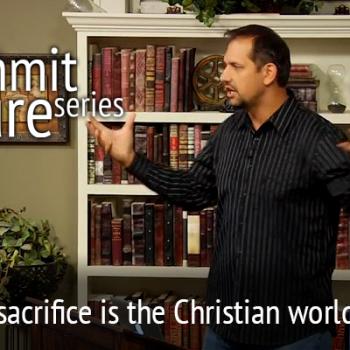
In this week’s PODCAST, as we continue in our chronological study of the life and ministry of Jesus, we come to Matthew 18:15-17 — one of the most important passages in all of the New Testament, the so-called “Church Discipline” passage.
Church Discipline, a teaching in many local churches that really rose into prominence in the late 1970’s and became quite the trend.
I can remember attending church leadership conferences back then and hearing pastors — I’ll use word “boast” — of the fact that they recently removed an individual or individuals from their churches, thereby “preserving the purity of their churches.” Others would then oooh and ahhh at the boldness of the pastor in confronting the sin in his church and taking decisive action in order to preserve the purity of his church by the process of Church Discipline as outline by Jesus here in Matthew 18.
Today, one of this nation’s leading Church Discipline proponents insists that church discipline, as outlined in Matthew 18, is one of the marks of a healthy church. He writes this on his website, clearly articulating the prevailing view of Church Discipline, and indeed includes this as one of his main talking points as he addresses pastors’ conferences throughout the country, encouraging them to do the same:
“Church discipline is the act of correcting sin in the life of the body, including the possible final step of excluding a professing Christian from membership in the church and participation in the Lord’s Supper because of serious unrepentant sin.”
Consequently, it has become (and in many places still is) standard practice to remove or “exclude” or excommunicate (you choose the term) unrepentant sinners from their local churches. Or if not standard practice, this notion of Church Discipline is certainly included in most of our churches’ bylaws.
Well, in light of the above definition — More importantly, in light of Jesus’ words in Matthew 18 — I must ask, Is that really what Jesus taught to His disciples and to us?
Let’s find out together.
We’ll start out by reading Matthew 18:12 and then 18:17, so that we can see the beginning and the end of this week’s roadmap:
12 “What do you think? If a man has a hundred sheep, and one of them goes astray, does he not leave the ninety-nine and go to the mountains to seek the one that is straying?
…17 And if he refuses to hear them, tell it to the church. But if he refuses even to hear the church, let him be to you like a heathen and a tax collector.
You know, in light of the Church Discipline quote above, as well as with the perspective of the Scriptures, I can’t help but wonder, how does one define a “serious” unrepentant sin?

I’m guessing most people immediately think of sexual sin when these words are uttered. But, what about gossip? Come to think of it, I personally know of many more churches that came unraveled due to rampant gossip than the total of zero churches that I know of that went astray due to two college students “going too far”. And, I recall reading in Proverbs,
16 There are six things which the Lord hates,
Yes, seven which are an abomination to Him:
17 Haughty eyes, a lying tongue,
And hands that shed innocent blood,
18 A heart that devises wicked plans,
Feet that run rapidly to evil,
19 A false witness who utters lies,
And one who spreads strife among brothers.
I mean, if “spreading strife” aka “sowing discord among brethren” aka “gossip” is an abomination to the Lord, this sounds like a pretty “serious” sin to me! But, I’ve never heard of anyone being kicked out of the church because of gossip.
Speaking of Proverbs chapter six, number one on the list is “haughty eyes”, aka “pride”. Yet, have you ever heard of someone being kicked out of their church because of their pride?
However, if you consider the root of the sin that transformed Lucifer into Satan – the sin of pride – you’d realize just how serious of a sin pride is in God’s eyes (and should be in ours). In fact, James 4:6 tells us,
“God opposes the proud
but shows favor to the humble.”
Or, if we are measuring sins and determining which are serious enough to take the “final step of excluding a professing Christian from membership in the church and participation in the Lord’s Supper because of serious unrepentant sin.” What about the sins of gluttony or drinking too much?
his father and mother shall take hold of him and bring him to the elders at the gate of his town. 20 They shall say to the elders, “This son of ours is stubborn and rebellious. He will not obey us. He is a glutton and a drunkard.” 21 Then all the men of his town are to stone him to death. You must purge the evil from among you. (Deuteronomy 21:19-21)
This passage makes gluttony, drunkenness, and disobeying your parents pretty “serious” sins!
And, if we, as the church, are going to “exclude a professing Christian from membership in the church and participation in the Lord’s Supper because of serious unrepentant sin”… who will carry this out? The senior pastor? His church staff? The church elders? The congregation at large? Who pulls the trigger? Especially in context of what Jesus did, as described in John 8 when the leaders of the local synagogue sought to remove from their congregation an immoral woman, caught in bed with a man she was not married to, and stone her.
“Teacher, this woman was caught in the act of adultery. 5 In the Law Moses commanded us to stone such women. Now what do you say?” 6 They were using this question as a trap, in order to have a basis for accusing him.
But Jesus bent down and started to write on the ground with his finger. 7 When they kept on questioning him, he straightened up and said to them, “Let any one of you who is without sin be the first to throw a stone at her.” 8 Again he stooped down and wrote on the ground.
9 At this, those who heard began to go away one at a time, the older ones first, until only Jesus was left, with the woman still standing there. 10 Jesus straightened up and asked her, “Woman, where are they? Has no one condemned you?”
11 “No one, sir,” she said.
“Then neither do I condemn you,” Jesus declared. “Go now and leave your life of sin.” (John 8:4-11)
My most important question, though, is this: Is Church Discipline for Christians who commit “serious unrepentant sins” really what Jesus taught to His disciples and to us?
In my opinion, the most egregious error people make when they cite Matthew 18 as their justification for Church Discipline is to rip verses 15-17 completely out of their context and treat these verses in isolation, without any regard of what Jesus said just before or just after those words.
Now, I admit that I am completely outside of the “mainstream” when it comes to reading (even printing) and applying this portion of Scripture. Even in most written translations, the printing companies separate verses 14 and 15 with a giant space and new topic heading such as “Dealing with Sin in the Church” (NIV), as if to say that Jesus was starting a whole new line of thinking, perhaps even teaching on a different day when He started speaking verse 15. I understand what the abiding principle operative in most churches today regarding this passage is. And I know that my understanding of this passage is not in perfect alignment with it. And I come to my understanding of it very reluctantly. But, I’m convinced that I’m reading the passage, and its message, correctly.
I view, and understand, verses 14, 15 and the preceding and succeeding verses in Matthew 18 as a singular teaching moment that Jesus took advantage of with a child on his lap.
12 “If a man has a hundred sheep and one of them wanders away, what will he do? Won’t he leave the ninety-nine others on the hills and go out to search for the one that is lost?13 And if he finds it, I tell you the truth, he will rejoice over it more than over the ninety-nine that didn’t wander away! (Matthew 18:12-13)
Now, if we look at the first part of this passage as Jesus does, as a metaphor with Jesus being the Good Shepherd and we are His sheep, then it’s easy to follow that at least one out of a hundred of us will periodically wander from the fold (make sinful choices, deny their faith, make compromises regarding their walk with Christ). In response, the Shepherd doesn’t exclude the lamb. No, He pursues the wandering lamb. Jesus, knowing that he was a mere six months away from His own crucifixion, wanted His followers to know that when He was gone, there will be people making commitments to Him that, that for their own reasons, will wander away and His followers are to pursue them like a shepherd when they do. That’s part of the Christ-follower’s job – to pursue the wandering sheep.
Why isn’t this quoted in church bylaws?
Then Jesus punctuated His point in verse 14:
14 That’s how it is with your Father in heaven. He doesn’t want any of these little ones to be lost. (Matthew 18:14)
This is the heart of God the Father – a Shepherd who goes after wandering sheep. In the parable of the Prodigal Son, the Father daily scanned the horizon, looking for his son to return. God pursues every beloved, little child, lamb, son, Christ-follower, who wanders away from the fold.
And as committed Christ-followers, we are to pursue them likewise.
15 “If another believer sins against you, go privately and point out the offense. If the other person listens and confesses it, you have won that person back. 16 But if you are unsuccessful, take one or two others with you and go back again, so that everything you say may be confirmed by two or three witnesses. 17 If the person still refuses to listen, take your case to the church. Then if he or she won’t accept the church’s decision, treat that person as a pagan or a corrupt tax collector. (Matthew 18:15-17)
Here’s something that so many Bible readers miss – these verses (15-18) are the explanation and application of the parable in the preceding verses (12-14)!
If someone misses the target that is God’s will – an unmistakable violation of God’s Commandments, NOT someone’s personal preferences – then YOU PURSUE THEM! And, as Paul instructed you gently restore the person.
Brothers and sisters, if someone is caught in a sin, you who live by the Spirit should restore that person gently. But watch yourselves, or you also may be tempted. 2 Carry each other’s burdens, and in this way you will fulfill the law of Christ.
Or, as James puts it, we should try to lead them back to God’s path, not reprove or exclude them…
19 My friends, if any followers have wandered away from the truth, you should try to lead them back. 20 If you turn sinners from the wrong way, you will save them from death, and many of their sins will be forgiven.
God’s heart is to pursue the wandering lambs.
We read this type of pursuit in the Contemporary English Version (CEV) of Matthew 18:15,
If one of my followers sins against you, go and point out what was wrong. But do it in private, just between the two of you. If that person listens, you have won back a follower.
However, what do you do if that person doesn’t listen and won’t respond according to God’s will? We find the answer to that dilemma in verse 16…
16 But if he will not hear, take with you one or two more, that ‘by the mouth of two or three witnesses every word may be established.’
Now, let’s be perfectly clear on this one…
This does not mean that you run to two or three of your buddies and exclaim, “You won’t believe what I just saw!” and the group of you saddle up like a posse out to arrest someone. The Scriptures tell us that, as the sin is repeated, there will be others who will witness the same violation of God’s Commandments.
In Matthew 18:16, Jesus is actually quoting Deuteronomy 19:15,
15 “One witness shall not rise against a man concerning any iniquity or any sin that he commits; by the mouth of two or three witnesses the matter shall be established.
So, what Jesus is referring to in Matthew 18 is NOT a new concept. It had been going on since Moses penned the Torah. It’s merely a transfer of the concept from the Jewish Law to the New Testament Church. It’s the method we should follow when a Christ-follower violates Biblical teaching, just the same as what a Jewish person should do if a fellow Jew violated the Law.
The goal is pursuit and redemption.
Now, there are many who insist that Jesus is introducing a new concept, or at least a new application to the ancient concept in Matthew 18:17, because He mentions the word “church”, which was new… so new that no churches even existed when Jesus said these words,
17 If the person still refuses to listen, take your case to the church.
But, let’s look at the actual words Jesus spoke. He actually used the Aramaic version of the Greek word “ekklesia”, which literally means “called out ones”. In this context, it is a clear reference to a “faith family” or “gathering of people”, who are called out of the world to follow Jesus.
And, again, it’s the responsibility, as shepherds, for the ekklesia to pursue the lost sheep and gently bring them back to the fold.
Also, when Jesus said to “take your case to the church”, He wasn’t indicating to go running to your senior pastor, elder board or any disciplinary panel and insist on a congregational business meeting where the entire body votes to exclude the person. No, Jesus was referring to the sinner-in-question’s faith family who love and care for them and want nothing else but to see them restored into God’s will for their lives.
Jesus then goes to the next step at the end of Matthew 18:17, the “kick ‘em out of church” phrase…
Then if he or she won’t accept the church’s decision, treat that person as a pagan or a corrupt tax collector.
Aha!
Wait… What did Jesus mean? Did He instruct us to exclude them from the body of Christ? To kick them out? How did Jesus treat pagans (unbelievers) and tax collectors?
He pursued them, as we read in Luke 15:1-2
Then all the tax collectors and the sinners drew near to Him to hear Him. 2 And the Pharisees and scribes complained, saying, “This Man receives sinners and eats with them.”
Jesus dared to break bread with the pagans and tax collectors!
Matthew, himself, the very author of the Gospel we’ve been examining was a tax collector! And Jesus pursued him.
So, does all this mean that there is never a time to exclude or kick out someone from their family of faith?
Actually, there is a time to do this. Paul did it. Once. It is rare and exceptional.
In 1 Corinthians 5, we read about a guy who was involved in ongoing, public, present tense sins that were so extreme and so exceptional that Paul described as “something even the pagans don’t do”. And this was in Corinth – the “Sin City” of its day!
And a major part of the problem was that the guy’s church not only knew about it, but they boasted about the fact that they accepted his behavior. So, Paul wrote them this,
“Shouldn’t you rather have gone into mourning and have put out of your fellowship a man who has been doing this? This is a cancer on the soul of your church. And you are making even the pagans outside of your church blush when they think about what you are approving.” (1 Corinthians 5)
It was a one-time, extreme circumstance that called for a one-time extreme action. And there is nothing – not one single word – that hints at the notion that Paul suggests that this is the pattern to be followed by every church every time somebody in the church commits a “serious sin”.
So, it all comes down to this:
“If a man has a hundred sheep and one of them wanders away, what will he do? Won’t he leave the ninety-nine others on the hills and go out to search for the one that is lost?
And if he finds it, I tell you the truth, he will rejoice over it more than over the ninety-nine that didn’t wander away! (Matthew 18:12-13)
That is the heart of God. It’s the heart of Jesus. And I pray that it will be our heart as well.

















